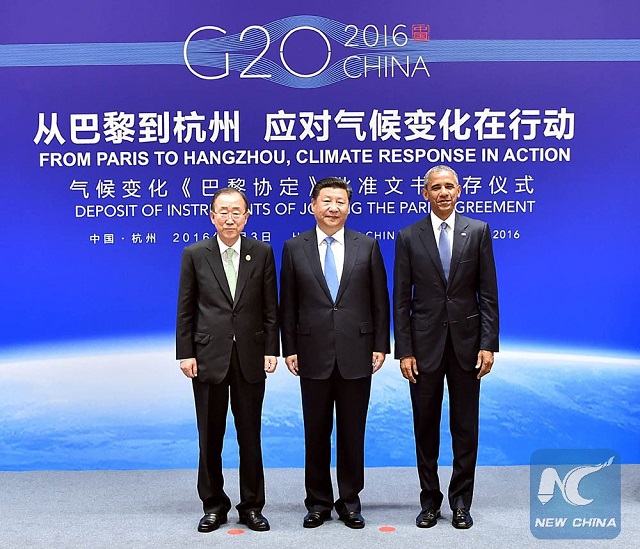
Paris, France | AFP |
Climate activists and small nations at risk of global warming’s direst consequences, welcomed Saturday’s ratification by China and the United States of a global pact to curb planet-harming carbon emissions.
The move by the world’s two largest greenhouse gas emitters brought the hard-fought agreement, concluded in Paris in December, a major step closer to taking legal effect, they said.
The previous international effort to curb reliance on planet-harming fossil fuels, the Kyoto Protocol, had excluded China and other developing nations, while the United States refused to sign up.
“It’s remarkable that in a few short years the world’s two leading climate antagonists have become the world’s two leading climate champions,” said Bob Perciasepe, president of the Center for Climate and Energy Solutions, a US-based think tank.
“The United States can no longer claim that China’s inaction is an excuse to do nothing, and vice versa. With both again committing themselves to a low-carbon future, the two countries are setting an example the rest of the world can hardly ignore.”
Observers urged others to follow suit, while stressing that mere ratification was not enough to meet the agreement’s goals.
The Paris pact has so far been signed by 180 countries, but will only take effect after 55 nations responsible for 55 percent of greenhouse gas emissions have ratified it — making it binding.
Depending on their constitutions, for many countries this means passing domestic legislation, In the US it can be done by executive presidential order.
China-U.S. Climate Change Cooperation Outcomeshttps://t.co/72durd1kEe pic.twitter.com/ibbiDQBIQv
— People’s Daily,China (@PDChina) September 3, 2016
Heavy-hitters on board
China and the United States, jointly responsible for about 38 percent of global emissions, ratified the Paris agreement on the eve of a meeting of G20 leaders meeting in Hangzhou, China, where all eyes will now be on other major economies to follow suit.
Until Beijing and Washington joined the club, 24 nations emitting just over one percent of global gases had officially acceded to the deal to cap global warming at two degrees Celsius (3.6 degrees Fahrenheit) over pre-Industrial Revolution levels.
This must be achieved by replacing atmosphere-polluting fossil fuels with renewable sources — an ambitious goal towards which most UN nations have already pledged emissions curbs.
“Today’s announcement is the strongest signal yet that what we agreed in Paris, will soon have the force of law,” said Mattlan Zackhras, Minister-in-Assistance to the President of the Republic of the Marshall Islands, which face the threat of climate-change induced sea-level rise.
“With the two biggest emitters ready to lead, the transition to a low-emissions, climate-resilient global economy is now irreversible.”
On current country pledges, scientists expect the world to warm by 3 C or more, and more drastic measures are needed to effect a large-scale shift towards wind, solar and other sustainable energies.
“Now, other countries must act swiftly to ratify the deal, and to reduce their emissions in line with the Paris Agreement’s long-term goals,” said Lo Sze Ping of environmental group WWF-China.
They should also move quickly towards “increasing their current pledges.”
The leadership shown by Washington and Beijing will do much to boost political momentum and goodwill, observers agreed.
“The fight against climate change remains difficult and urgent, but having heavy-hitters like China and the US on your side is extremely heartening,” commented the UN Environment Programme’s Erik Solheim.
 The Independent Uganda: You get the Truth we Pay the Price
The Independent Uganda: You get the Truth we Pay the Price





